[Dec 2007, Volume 4 Quarterly Issue] Pdf File size - The IIPM Think ...
[Dec 2007, Volume 4 Quarterly Issue] Pdf File size - The IIPM Think ...
[Dec 2007, Volume 4 Quarterly Issue] Pdf File size - The IIPM Think ...
Create successful ePaper yourself
Turn your PDF publications into a flip-book with our unique Google optimized e-Paper software.
MORE MARKETS, LESS GOVERNMENT<br />
at the core of all attempts to articulate<br />
a notion of civil society in that period,<br />
and since, has been the problematic relation<br />
between the private and the public;<br />
the individual and the social; public ethics<br />
and individual interests; and individual<br />
passions, and public concerns.’ 10<br />
<strong>The</strong> organization of society being an endeavor<br />
of immediate concern, the inclusion<br />
of civil society as a building block is<br />
as relevant and in this context plays a<br />
normative role. Civil society as a normative<br />
ideal emerged, as Seligman points<br />
out to ‘as the result of a crisis in social<br />
order and a breakdown of existing paradigms<br />
of the idea of order.’ 11 <strong>The</strong> stress<br />
points and crisis refers to that between<br />
the State and individual interests. <strong>The</strong><br />
role of civil society has been assessed in<br />
these contexts, and to discharge which<br />
role civil society ‘is most usefully thought<br />
as identifying a set of human capacities,<br />
moral and political.’ 12 This is an effective<br />
expression to hold on to for assessing<br />
the impact of civil society when<br />
functioning as a part of the triad formed<br />
by the State, the market and the<br />
civil society.<br />
Spread Of Markets, Influence<br />
Of States And <strong>The</strong> Colonial<br />
Period In India<br />
It is a point that is made that the state of<br />
the economy in the earlier part of the<br />
eighteenth century in India was not so<br />
different as compared to that in Britain<br />
and other European countries. It is observed<br />
that the ‘economies of India,<br />
China, and other Asian regions in the<br />
early eighteenth century were not so different<br />
– hardly less sophisticated than in<br />
Europe’ and that ‘the economies of Britain<br />
and Europe accelerated after 1750,<br />
quickly outstripping those of India, China,<br />
Japan and the rest of Asia.’ 13 <strong>The</strong><br />
stirrings of the early differences began<br />
at some time during the seventeenth and<br />
the eighteenth centuries. <strong>The</strong> case study<br />
of India is an illustration of what occurred<br />
as a response to the emergent<br />
State and interactions between the State,<br />
the market and the civil society.<br />
<strong>The</strong> pre-colonial history of India has<br />
a continuity that is easily segregated<br />
from that of the beginnings of the arrival<br />
of commercial class from Britain<br />
and other European nation states to India<br />
in search of markets. This early history<br />
of travelers, merchants and those of<br />
the East India Company officials are<br />
that of commercial interests in search of<br />
markets. In various ways the State in<br />
Britain and those in other nations too<br />
emerged as supporters that enabled a<br />
deepening of interests. It is, however,<br />
the cessation of the Company rule and<br />
the initiation of the colonial rule by the<br />
State in Britain that the changes came<br />
into much sharper focus. This is expected<br />
inasmuch as the rule by the colonial<br />
State was qualitatively different from<br />
that by commercial interests in the form<br />
of the Company supported though the<br />
Company was by the State. Accordingly,<br />
while the early stages, and that prior to<br />
the proclamation transferring power to<br />
the State of Britain of the territory of<br />
India, offers a fascinating story of the<br />
manner in which the commercial class<br />
established its presence in the country,<br />
it is the firming up of the relationships<br />
under the State that is of relevance here.<br />
<strong>The</strong> response of the civil society to the<br />
colonial State was at once sharp and often<br />
provocative. Dadabhai Naoroji, the<br />
forefront spokesperson of the economic<br />
drain theory and who estimated the<br />
drain to be to the extent of ‘30,000,000<br />
to 40,000,000 a year’ did not find any<br />
issues with the ‘operations of economic<br />
laws’ as a cause behind this sorry state<br />
of India. Instead, he identified the British<br />
State and its policies that were the<br />
cause. Writing in 1880, Dadabhai pointed<br />
out that, ‘It is not the pitiless operations<br />
of economic laws, but it is the<br />
thoughtless and pitiless action of the<br />
British policy; … in short, it is the pitiless<br />
perversion of economic laws by the<br />
sad bleeding to which India is subjected,<br />
that is destroying India.’ 14 <strong>The</strong> point<br />
Dadabhai Naoroji, the forefront spokesperson of the economic<br />
drain theory and who estimated the drain to be to<br />
the extent of ‘30,000,000 to 40,000,000 a year’ did not<br />
find any issues with the ‘operations of economic laws’ as a<br />
cause behind this sorry state of India<br />
about the overreach by the State was not<br />
restricted to identifying that it was the<br />
role of the State, and the manner in<br />
which the State denuded the economy<br />
causing, that were the reason for the severe<br />
handicap faced by the populace of<br />
the country over which the State presided.<br />
A further issue was raised, and it<br />
was about the operation and influence<br />
of the colonial State as against that of<br />
the pre-colonial State. Dadabhai pointed<br />
out that under the suzerainty of the<br />
THE INDIA ECONOMY REVIEW<br />
27


![[Dec 2007, Volume 4 Quarterly Issue] Pdf File size - The IIPM Think ...](https://img.yumpu.com/29766298/26/500x640/dec-2007-volume-4-quarterly-issue-pdf-file-size-the-iipm-think-.jpg)
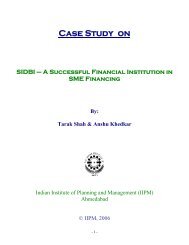
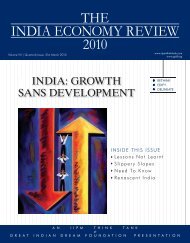
![[Feb 2008, Volume V Annual Issue] Pdf File size - The IIPM Think Tank](https://img.yumpu.com/43961117/1/190x245/feb-2008-volume-v-annual-issue-pdf-file-size-the-iipm-think-tank.jpg?quality=85)
![[June 2008, Volume V Quarterly Issue] Pdf File size - The IIPM Think ...](https://img.yumpu.com/41693247/1/190x245/june-2008-volume-v-quarterly-issue-pdf-file-size-the-iipm-think-.jpg?quality=85)


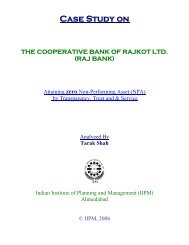
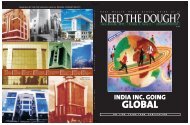

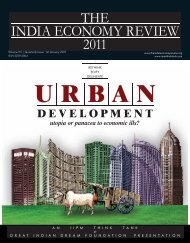
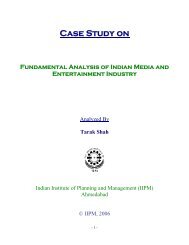
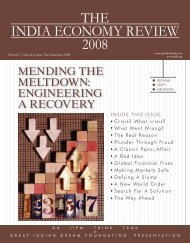
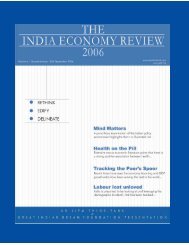
![[Volume VI | Quarterly Issue: 31st May 2009] Pdf File size](https://img.yumpu.com/27796051/1/190x245/volume-vi-quarterly-issue-31st-may-2009-pdf-file-size.jpg?quality=85)